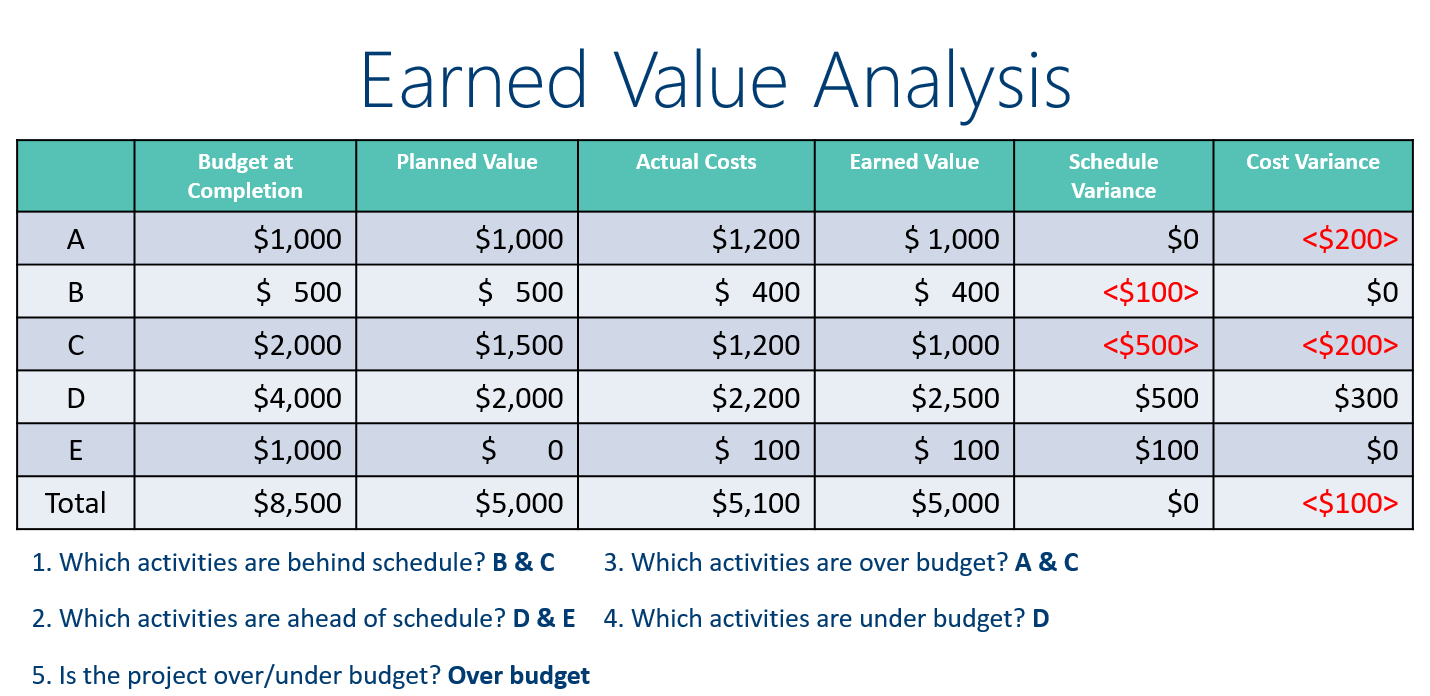Understanding the concept of earned value is not easy. Earned value is a technique for measuring project performance and progress in an objective manner. It involves looking at data from each individual task. First a few common terms:
PV - Planned Value – What was budgeted
AC - Actual Cost – What was spent
EV - Earned Value - What was accomplished
[VIDEO] PM in Theory - Earned Value Basics
As project managers, we are frequently asked “How is the project going? Are you on budget? Are you on schedule?” The informed response would be the result of the analysis of your earned value. Not just your budget or timeline. Of course, in a perfect world, every one of your resources has completed each one of his/her tasks on schedule AND he/she took exactly the number of hours planned to complete each task. We all know that we don’t live in that world. In fact, if we did live in that world, project managers wouldn’t be nearly as valuable.
The reality of project management is that each task is going to be completed by a human being and as humans, we all look at tasks differently and have different skill sets and experience. So, a task that is planned to take $1,600 to complete will almost certainly not end up with that same earned value. Learning how to use earned value will enable you to analyze your project and adjust as you go. Being a valuable PM is all about being able to spot issues and offer solutions.
Let’s start by breaking it down to just one (1) task. For our task, let’s say you planned to take 16 hours of developer time at $100/hour for Task1. $1,600 (cost) is our planned value. Further, let’s say you planned 2 days (schedule) to complete the task.
When the time comes to do the task, you assign Joe to Task 1. At the end of the first day, 8 hours into your project, Joe reports that he is 50% done and expects to take another 8 hours to finish the task. In this case, you have a zero cost variance, a zero schedule variance and an earned value of $800. Perfect. This is Ex.1 in the table below.
Let’s look at what would happen should Joe report different data:
|
Budget |
Planned Value |
Actual Costs |
Earned Value |
Schedule Variance |
Cost Variance |
| Ex.1 |
$1,600 |
$1,600 |
$800 |
$1,600 |
$0 |
$0 |
| Ex.2 |
$1,600 |
$1,600 |
$600 |
$1,400 |
Behind $200 |
$0 |
| Ex.3 |
$1,600 |
$1,600 |
$600 |
$1,800 |
$0 |
Under $200 |
| Ex.4 |
$1,600 |
$1,600 |
$1,000 |
$1,200 |
Behind $200 |
Over $200 |
- Ex.2 shows Joe reporting he has spent 6 hours and still needs another 10 hours to complete the task, which he will do tomorrow. As of today, our earned value is down a bit but based on Joe’s expectation of finishing tomorrow we would end up back on track. It’s not great that he is behind schedule and planning to work 10 hours tomorrow, but it appears he’ll finish on time and within budget. No action needed today but you might want to check in with Joe mid-day tomorrow and be sure things are going well.
- Ex.3 shows Joe reporting he has spent 6 hours and only needs another 6 hours to complete the task. He is on schedule because he reported completing half the work today. He is under on cost because he is expecting to only use 12 hours. Excellent! In this case, your earned value is higher than planned value. It is situations like these that offset situations like Ex. 4 below.
- Ex.4 shows Joe reporting he has spent 10 hours and needs another 10 hours to complete the task. He is both behind schedule and over budget. Time to act!
These are 4 simple examples of one task. Imagine you have 100 or even 10,000 tasks in your project. Seeing an overall view of how each task is performing gives you powerful insight!
In Project Insight’s Earned Value Basics webinar, Diane Buckley, CEO of Core Performance Concepts Inc. discusses the technique or concept. Project managers often have responsibility for the actual costs but not as often the planned value. Implementing the earned value concept within your organization can give you the ability to stay on top of your project and react in a timely manner when issues do arise.
Here is a screen shot from the webinar which shows 5 different tasks and how each is performing. Diane will help you walk through answers to the 5 questions she listed below the table.

In summary, earned value analysis is a very powerful tool and can help make you an excellent project manager. Accurate and timely information is absolutely required to complete your analysis. Lucky for all of us, Project Insight is built to handle and report earned value!
Questions or comments? Feel free to share them below!
You may also like:
ABOUT THE AUTHOR: Patti is a Project Management Consultant with over 15 years of experience managing complex website projects. She works with clients in many industries including software development, healthcare and professional organizations. Learn more about Patti on LinkedIn.